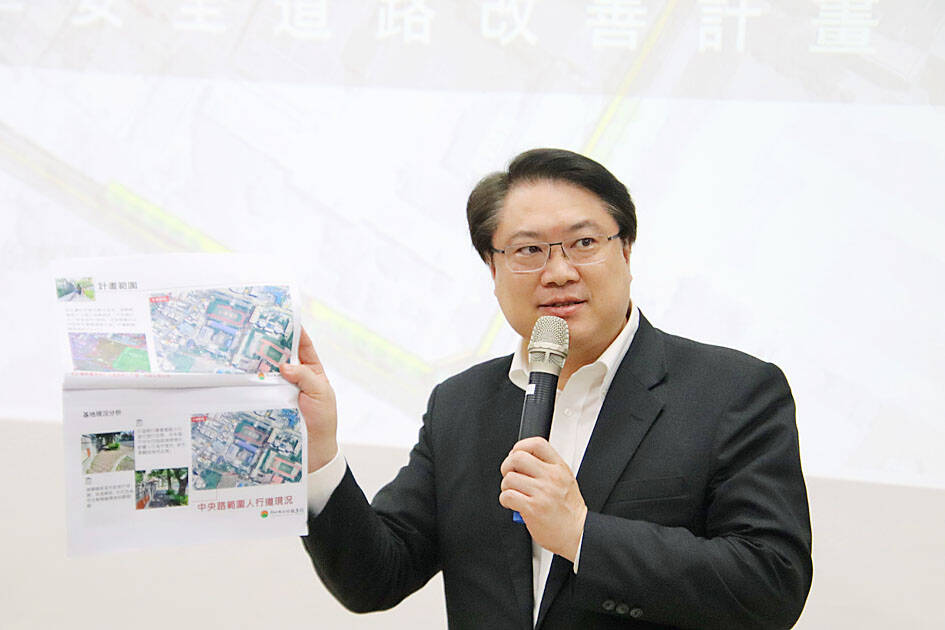The government is considering relaxing immigration rules for migrant workers and foreign students as part of efforts to address a labor shortage and issues linked to the nation’s low birthrate, Minister of the Interior Lin Yu-chang (林右昌) told a trade group yesterday.
Lin made the remarks while giving the keynote speech at a meeting in Taipei of the Third Wednesday Club (三三會), whose membership is limited to the top 100 firms in each business sector.
“We should embrace different views in dealing with foreign workers who currently serve as caregivers for ill senior citizens and work at construction sites,” Lin said.

Photo: Huang Mei-chu, Taipei Times
It is not fair or humane to dismiss caregivers after they have looked after people’s family members for the legal maximum of 12 years and have developed a close relationship with their employers, Lin said.
Perhaps they should be allowed to stay and be naturalized, the minister said.
Similarly, the government is considering whether male migrant workers who work on public and private construction projects should be allowed to stay in Taiwan for good, Lin said, adding that they are currently required to leave after their contracts expire in four to five years.
They usually have received years of training in Taiwan and are therefore welcomed by employers in South Korea and Japan, he said.
“We should revisit our immigration rules, rather than train workers on behalf of other nations,” Lin said.
The change is necessary as Taiwan is to become a super-aged society in 2025, when people aged 65 or older are to account for more than 20 percent of the population, he said.
Taiwan already became an aged society in 2018, with people aged 65 or older making up 14 percent of the population, and the birthrate has declined, Lin said.
The demographic structure is unfavorable for the workforce, causes other social security issues and it would require decades to rectify, the minister said, adding that labor shortages are affecting all levels of the workforce: unskilled, skilled and managerial employees.
Foreign students are another solution, and the government is considering allowing them to extend their stay, giving them two years, instead of 12 months, to find employment in Taiwan upon graduation, the minister said.
Toward that end, policymakers are also debating lowering the wage requirement from NT$42,500 a month, as most graduates in Taiwan have difficulty finding a job that pays that much, Lin said.
The government has offered assorted benefits to boost fertility rates, but to little avail, he added.

TEMPORARY TRUCE: China has made concessions to ease rare earth trade controls, among others, while Washington holds fire on a 100% tariff on all Chinese goods China is effectively suspending implementation of additional export controls on rare earth metals and terminating investigations targeting US companies in the semiconductor supply chain, the White House announced. The White House on Saturday issued a fact sheet outlining some details of the trade pact agreed to earlier in the week by US President Donald Trump and Chinese President Xi Jinping (習近平) that aimed to ease tensions between the world’s two largest economies. Under the deal, China is to issue general licenses valid for exports of rare earths, gallium, germanium, antimony and graphite “for the benefit of US end users and their suppliers

Dutch chipmaker Nexperia BV’s China unit yesterday said that it had established sufficient inventories of finished goods and works-in-progress, and that its supply chain remained secure and stable after its parent halted wafer supplies. The Dutch company suspended supplies of wafers to its Chinese assembly plant a week ago, calling it “a direct consequence of the local management’s recent failure to comply with the agreed contractual payment terms,” Reuters reported on Friday last week. Its China unit called Nexperia’s suspension “unilateral” and “extremely irresponsible,” adding that the Dutch parent’s claim about contractual payment was “misleading and highly deceptive,” according to a statement

The Chinese government has issued guidance requiring new data center projects that have received any state funds to only use domestically made artificial intelligence (AI) chips, two sources familiar with the matter told Reuters. In recent weeks, Chinese regulatory authorities have ordered such data centers that are less than 30 percent complete to remove all installed foreign chips, or cancel plans to purchase them, while projects in a more advanced stage would be decided on a case-by-case basis, the sources said. The move could represent one of China’s most aggressive steps yet to eliminate foreign technology from its critical infrastructure amid a

Nissan Motor Co has agreed to sell its global headquarters in Yokohama for ¥97 billion (US$630 million) to a group sponsored by Taiwanese autoparts maker Minth Group (敏實集團), as the struggling automaker seeks to shore up its financial position. The acquisition is led by a special purchase company managed by KJR Management Ltd, a Japanese real-estate unit of private equity giant KKR & Co, people familiar with the matter said. KJR said it would act as asset manager together with Mizuho Real Estate Management Co. Nissan is undergoing a broad cost-cutting campaign by eliminating jobs and shuttering plants as it grapples